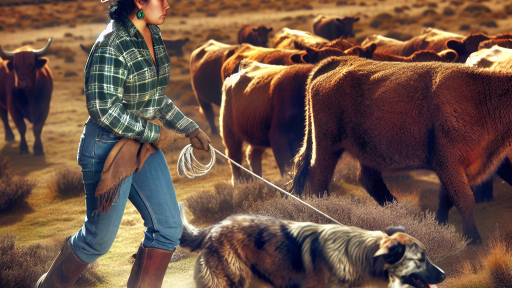Introduction to Exotic Livestock
Understanding Exotic Livestock
Exotic livestock refers to species not traditionally farmed in a region.
These animals can include llamas, emus, or alpacas.
Farmers often consider these species for their unique benefits.
Additionally, they can diversify agricultural products.
Benefits of Raising Exotic Livestock
Raising exotic livestock presents numerous advantages.
They often require less feed compared to traditional species.
Some breeds are better suited for specific climates.
This adaptability can lead to better survival rates.
Moreover, exotic species can offer niche markets.
Products such as fiber or specialty meats can enhance income.
Challenges of Exotic Livestock Management
Despite the benefits, there are distinct challenges.
One major issue involves regulatory compliance.
Farmers must navigate local laws on exotic species ownership.
Additionally, veterinary care may present difficulties.
Finding qualified professionals can become an obstacle.
Transform Your Agribusiness
Unlock your farm's potential with expert advice tailored to your needs. Get actionable steps that drive real results.
Get StartedLastly, some exotic animals need specialized care.
This requirement may demand more time and resources.
Cost-Effective Practices for Managing Exotic Livestock
Cost-effective management strategies are crucial for success.
Farmers can implement rotational grazing techniques.
This approach can improve pasture health and reduce feed costs.
Additionally, forming co-ops can share resources among farmers.
This cooperation can lower purchasing costs significantly.
Innovative feeding strategies also play a role.
Utilizing local and sustainable feed sources helps minimize expenses.
Regular health monitoring can prevent expensive health issues.
Identifying Cost-Effective Exotic Livestock Options
Understanding Exotic Livestock Types
Exotic livestock comes in various types, each with unique benefits.
Common examples include llamas, alpacas, and miniature donkeys.
Each species has specific requirements that may affect overall costs.
Evaluating Initial Investment and Operating Costs
Initial investments can vary between different types of exotic livestock.
For example, llamas typically require less investment than zebras.
Operating costs should include food, housing, and healthcare considerations.
Additionally, consider the cost of veterinary services for exotic animals.
Researching Local Markets and Demand
Understanding your local market influences exotic livestock choices.
Identify what species have demand in your area.
Networking with local farmers helps gather insights on successful breeds.
Market demands can dictate which exotic species are profitable.
Utilizing Resources and Partnerships
Many organizations provide support for exotic livestock management.
Research local agricultural extension services for helpful resources.
Building partnerships with fellow farmers promotes shared knowledge.
Showcase Your Farming Business
Publish your professional farming services profile on our blog for a one-time fee of $200 and reach a dedicated audience of farmers and agribusiness owners.
Publish Your ProfileJoint purchasing of feed and supplies can reduce overall costs.
Adopting Best Practices for Care and Management
Proper management techniques reduce potential expenses and enhance health.
Regular vet check-ups prevent expensive medical interventions later.
Establish feeding schedules to optimize feed efficiency.
Investing in quality housing ensures animal safety and comfort.
Budgeting for Exotic Livestock
Initial Costs
Starting an exotic livestock venture requires careful financial planning.
Research the specific breed you wish to raise.
Costs vary based on species, availability, and regional factors.
Buying healthy livestock from reputable breeders is crucial.
Consider transportation costs to bring animals to your farm.
Prepare for facility setup costs such as fencing and shelters.
Invest in proper habitat to ensure animal comfort and safety.
Initial health checks and vaccinations may also incur expenses.
Leave room in your budget for unexpected expenses.
Overall, a detailed initial budget helps lay a solid foundation.
Ongoing Costs
Maintaining exotic livestock involves regular operational expenses.
Annual feed costs are a significant ongoing expense.
Choose quality feed that meets the nutritional needs of your animals.
Veterinary services also represent a consistent cost.
Routine check-ups and vaccinations keep livestock healthy.
Consider insurance options to safeguard your investment.
Utilities such as water and electricity play a role in your budget.
Finally, factor in maintenance costs for enclosures and equipment.
Monitoring your ongoing expenses is essential for profitability.
Potential Revenue Streams
Despite the costs, exotic livestock can provide various revenue opportunities.
Consider breeding animals to generate additional income.
Sell offspring to other enthusiasts or markets.
Offering educational tours can attract visitors to your farm.
Moreover, unique livestock can enhance agritourism experiences.
Participating in local farmers’ markets can also boost your income.
Additionally, exotic meat or product sales may expand your business.
Evaluating potential revenue helps balance your overall budget.
Ultimately, a well-planned budget positions your business for success.
Discover More: Managing Goat Behavior on the Farm
Feeding Strategies for Cost Efficiency in Exotic Livestock Management
Understanding Nutritional Needs
Assess the specific nutritional requirements of each species.
Every type of exotic livestock has unique dietary needs.
Research these requirements to ensure proper care.
Consider consulting a veterinarian for expert guidance.
Utilizing Locally Sourced Feed
Explore local feed options that may reduce costs.
Locally sourced feed often provides vital nutrients.
Showcase Your Farming Business
Publish your professional farming services profile on our blog for a one-time fee of $200 and reach a dedicated audience of farmers and agribusiness owners.
Publish Your ProfileThis approach can improve the overall health of livestock.
Additionally, it supports local economies.
Implementing a Balanced Diet Plan
Design a balanced feeding regimen for your animals.
Include a variety of food sources for comprehensive nutrition.
Monitor their health regularly to adjust the diet as needed.
Maintain records of feeding practices to track effectiveness.
Efficient Feed Storage Techniques
Invest in proper storage solutions for feed materials.
Effective storage prevents spoilage and waste.
Utilize airtight containers to keep feed fresh.
Implement rotation strategies to use older feed first.
Exploring Alternative Feed Ingredients
Research alternative feed ingredients to enhance cost-effectiveness.
Consider by-products from agriculture as feed sources.
These alternatives can be highly nutritious and affordable.
Conduct tests to ensure digestibility and quality.
Monitoring and Reviewing Feeding Practices
Establish regular reviews of your feeding strategies.
Evaluate the cost-effectiveness and nutritional outcomes.
Adjust as necessary based on findings.
Involve staff in discussions for diverse perspectives.
See Related Content: Eco-Friendly Practices for Exotic Farming
Health Management Practices to Minimize Veterinary Expenses
Preventive Care
Implementing preventive care saves significant veterinary costs over time.
Regular health check-ups detect problems early, ensuring timely treatment.
This can significantly reduce long-term health expenses for your livestock.
Vaccinations are crucial and help protect against common diseases.
Establish a vaccination schedule tailored to your livestock’s specific needs.
Nutrition Management
Proper nutrition is the foundation of good health for exotic livestock.
Provide a balanced diet rich in essential nutrients to promote strong immune systems.
Monitor dietary intake to prevent deficiencies that can lead to health issues.
Additionally, consider locally sourced feed for cost-effectiveness.
Regularly evaluate your feeding strategies to enhance their effectiveness.
Hygiene Practices
Maintaining excellent hygiene reduces the risk of infectious diseases.
Design accessible and clean living spaces for your animals.
Regularly clean and disinfect animal housing and feeding areas.
Implement effective waste management to minimize exposure to pathogens.
Encourage good hygienic practices among staff involved in care.
Observation and Record Keeping
Routine observation enables you to detect health issues promptly.
Train staff to recognize signs of illness or changes in behavior.
Keep detailed health records to track vaccinations and treatments.
Analyze these records to identify any recurring health issues.
This information is essential for making informed health management decisions.
Partnership with Veterinarians
Develop a strong relationship with a qualified veterinarian.
Showcase Your Farming Business
Publish your professional farming services profile on our blog for a one-time fee of $200 and reach a dedicated audience of farmers and agribusiness owners.
Publish Your ProfileRegular consultations ensure you stay ahead of potential health risks.
Veterinarians can provide valuable guidance on nutrition, vaccinations, and treatments.
Incorporate their advice into your health management plan.
This proactive approach helps minimize unexpected veterinary expenses.
Find Out More: Choosing the Right Equipment for Your Aquaculture Setup

Utilizing Sustainable Practices for Exotic Livestock Care
Importance of Sustainable Practices
Sustainable practices are essential for managing exotic livestock.
They promote environmental health while ensuring animal welfare.
Additionally, these practices can lead to cost savings over time.
Feeding Strategies
Implementing diverse feeding strategies enhances nutrition.
Utilize locally sourced feed whenever possible.
Consider growing your own fodder to reduce costs.
Integrate forage-based diets to support sustainable grazing.
Waste Management Techniques
Effective waste management reduces environmental impacts.
Composting manure creates valuable organic fertilizer.
Using natural decomposers can speed up the process.
Implementing bio-digesters can also generate biogas for energy.
Water Conservation Methods
Conserving water is vital in exotic livestock management.
Implement rainwater harvesting systems to collect runoff.
Use drip irrigation for more efficient water use.
Monitor water quality to promote animal health and productivity.
Health and Veterinary Care
Regular health checks ensure the well-being of foreign species.
Work with veterinarians familiar with exotic animals.
Preventative measures help reduce health complications.
Ensure vaccinations are up to date to protect your livestock.
Community Engagement and Education
Engaging with local communities enhances sustainable practices.
Share knowledge and experiences with other farmers.
Participate in workshops to learn new techniques.
Building networks fosters support among livestock managers.
You Might Also Like: Water Recirculation Systems for Efficient Fish Farming
Marketing Exotic Livestock: Strategies for Profit Generation
Identifying Target Markets
Understanding your target market is crucial for successful sales.
Research potential customers who buy exotic livestock.
Consider niche markets, such as collectors or small farms.
Next, evaluate demographic factors, including income levels and location.
Determine the size of the market to estimate sales potential.
Building a Strong Brand
A strong brand distinguishes your livestock business from competitors.
Start by developing a memorable logo and tagline.
Communicate your unique selling points clearly.
Additionally, build a professional website to showcase your offerings.
Use social media to engage with your audience and promote your brand.
Effective Advertising Strategies
Leverage various advertising channels to reach potential buyers.
Showcase Your Farming Business
Publish your professional farming services profile on our blog for a one-time fee of $200 and reach a dedicated audience of farmers and agribusiness owners.
Publish Your ProfileConsider both online and traditional marketing techniques.
Social media platforms can help increase visibility and reach.
Attend trade shows and exhibitions to connect with enthusiasts.
Utilize local newspapers or community boards for announcements.
Creating Informative Content
Informative content can position your business as an authority.
Write blog posts about the benefits of owning exotic livestock.
Offer care guides that educate potential customers.
Moreover, create videos highlighting the unique aspects of your livestock.
Sharing success stories from existing customers can build trust.
Networking and Partnerships
Networking can lead to valuable connections in the industry.
Partner with veterinarians who specialize in exotic animals.
Collaborate with local agricultural fairs or exhibitions for exposure.
Building relationships with other livestock owners can be beneficial.
Consider joining industry associations to gain insights and support.
Utilizing Online Marketplaces
Online marketplaces can expand your reach significantly.
Leverage platforms designed for buying and selling livestock.
Create attractive listings that highlight key features of your animals.
Ensure that your listings include high-quality images and detailed descriptions.
Monitor feedback and adjust your strategies based on customer responses.
Case Studies of Successful Cost-Effective Exotic Livestock Farms
Innovative Practices at Green Pastures Ranch
Green Pastures Ranch utilizes vertical farming techniques to raise exotic livestock.
This method allows for maximum efficiency in space usage.
The ranch focuses on raising alpacas and emus, which require minimal resources.
Moreover, they practice rotational grazing to enhance pasture regeneration.
This technique reduces feed costs while maintaining animal health.
Additionally, the ranch incorporates sustainable water management systems.
These systems capture rainwater for livestock hydration and irrigation.
Eco-Friendly Approaches at Wild Haven Farm
Wild Haven Farm has adopted organic practices for its exotic poultry operations.
They specifically raise ducks and quail, which thrive in natural habitats.
The farm benefits from a strong community network for sharing resources.
Collaboration reduces overhead costs and increases profitability.
Furthermore, they implement integrated pest management strategies.
These strategies minimize chemical use while enhancing produce quality.
The farm prides itself on maintaining a low carbon footprint.
Utilizing Technology at Safari Meadows
Safari Meadows employs advanced technology in exotic animal husbandry.
The farm uses automated feeding systems to optimize resource allocation.
By monitoring livestock behavior through sensors, they improve animal welfare.
This data-driven approach enhances overall farm management efficiency.
Moreover, they utilize renewable energy sources to power farm operations.
Solar panels significantly reduce energy costs for the farm.
The combined efforts result in substantial savings and productivity gains.
Showcase Your Farming Business
Publish your professional farming services profile on our blog for a one-time fee of $200 and reach a dedicated audience of farmers and agribusiness owners.
Publish Your ProfileCommunity Supported Agriculture at Jungle Roots
Jungle Roots operates on a community-supported agriculture model.
Members invest in operations and receive monthly shares of exotic products.
This model ensures consistent cash flow and reduces marketing expenses.
They raise exotic goats known for their high-quality milk and meat.
Additionally, the farm encourages member participation in farm activities.
This engagement fosters a stronger community connection.
It also promotes educational opportunities related to livestock management.
Additional Resources
Grants and Funding | National Invasive Species Information Center




